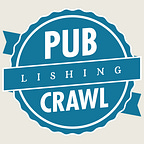This week JJ and Kelly resurrect the Writing Mechanics series with PACING. Also Kelly does tone research and JJ recovers from an emotional book hangover.
Show Notes
Pacing is related to stakes and tension and conflict: if those three are well-balanced and developed, then pacing shouldn't be a huge issue.
Pacing problems often come down to Too Slow or Not Developed Enough.
If the pace is too slow, it generally means that not enough is happening to move the story forward. Forward momentum in a story comes from a sense of change or growth. Some things to keep in mind while drafting if you sense the pace is too slow:
Make sure each of your scenes has a point. Does the scene move the plot forward? Does it advance relationships? Does it do both?
Make sure that something changes the status quo in each scene...and then follow up on that change in status quo. Don't leave it there. Follow through on the consequences!
Slower-paced books are not inherently bad—as long as the pace is consistent. When something is "too slow," it means it doesn't hold the reader's interest.
Episodic books often read slowly because a conflict is introduced and then resolved without a complication before the next conflict is introduced.
It's less common to read books that are considered "too fast," but many books do suffer from rushed conclusions.
This often comes up with a climax that isn't properly set up and there is a sudden external conflict that throws the protagonists into danger (e.g. big action sequences).
Rushed conclusions often suffer from a sense of deus ex machina; that is, some force from outside the protagonist resolves the conflict.
Withholding information does not build tension; if the reader doesn't know what's at stake until it matters, then it's hard to care.
Books that feel too rushed are often plot-heavy books that don't give the reader (or the characters) time to breathe and process what is happening in the book.
Good pacing is being judicious and careful with how and when important information is parceled out in the book.
What We're Working On
Kelly is working on a short erotica story! She's also working on her novel.
JJ is still working on book 2.
Books Discussed/What We're Reading
Harry Potter and the Deathly Hallows by J. K. Rowling
Twilight by Stephenie Meyer
The Thief by Megan Whalen Turner
Morning Star by Pierce Brown
Saga Vol. I, II, III, IV, V and VI by Brian K. Vaughan and Fiona Staples
Eligible by Curtis Sittenfeld
Fangirl by Rainbow Rowell
Off Menu Recommendations
What You're Asking
If y'all did an episode on outlining that would be fab, or pantsing I suppose and revising after. —Ameya Shakti
JJ wrote a post on PubCrawl on Reverse Outlining for those of us who are pantsers. The fundamental difference between pantsers and plotters really comes down to whether or not they figure out their story as they're writing or before they write. Revising for pantsers often means finding order in chaos, whereas revising for plotters often means putting flesh and sinew on bones.
Hi Kelly and JJ!
I’m getting ready for NaNoWriMo by outlining and working through details of my story. It’s a retelling of “Much Ado About Nothing” set at Comic Con. I have created several ‘fandoms’ of my own that my story will revolve around but I’m wondering how I go about mentioning other fandoms that really exist. Am I over stepping the fair use bounds if I just casually mention fandoms like Harry Potter, Doctor Who, Firefly, and yes, even Hamilton? Do I just need to create parodies of them or should I keep creating my own to make my setting work?
I would love and deeply appreciate your insight. —Emily
In terms of fair use, mentioning other properties wouldn't be a violation if you're not actually using said properties, only mentioning that it exists. These references are essentially just pop culture references.
What You're Saying
Superb listening! ★★★★★ aNat4321 I've been a longtime fan of PubCrawl and have enjoyed every episode I've listened to. JJ and Kelly are clearly very knowledgable and love the art and business of publishing YA. Definitely would recommend to anyone aspiring to the traditional publishing route!
Thank you! We do apologize we don't have more useful information about self-publishing, but perhaps we will have a guest in the future who might be of more use!
That's all for this week! Next week we'll continue our Writing Mechanics series with TONE and MOOD. As always, if you have any questions, please leave them in the comments, or reach out to us on Twitter with the hashtag #askpubcrawl.




